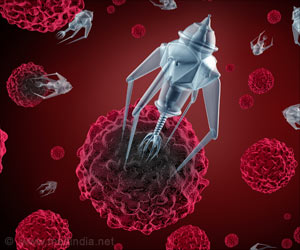Nano springs containing cobalt and cobalt-iron have magnetic and elastic properties that may be used for targeted delivery of anticancer agents

‘Deleterious side effects of anticancer drugs may be reduced by using nanospring based targeted drug delivery.’
Read More..




"In the course of our experiments we obtained cobalt and cobalt-iron nanosprings and studied their magnetic properties in detail for the first time," says Alexander Samardak, Associate professor of the Department of Computer Systems, School of Natural Sciences, FEFU.Read More..
"Apparently, these chiral nano-objects show different magnetisation reversal processes comparing to cylinder-shaped nanowires under the action of an external magnetic fields. This property may be used for their efficient control including magnetic field-driven movement."
According to the scientists, the mechanical properties of nanosprings are practically identical to those of macro-springs, which opens a range of possibilities for their use in nanotechnologies.
"Nanosprings are unique objects with peculiar physical properties. This provides for their possible use in new data storage devices, nanoelectromechanical systems, and in biomedicine.
Materials like this can be used to create nanomotors, protein molecules express testing systems, transportation capsules for molecular compounds, and many other useful devices," comments Alexey Ognev, Head of the Laboratory of Film Technologies at the Department of Physics of Low-Dimensional Structures, School of Natural Sciences, FEFU.
Advertisement
The 'Materials' priority science project of the Far Eastern Federal University unites gifted young physicists, chemists, biologists, and specialists in material studies. They have already developed a new type of optical ceramics for ground and space optical connection, a heat-resisting material with record-setting melting temperature, and a number of other prospective projects.
Advertisement
Source-Eurekalert








